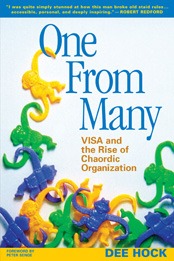One From Many 2nd Edition
VISA and the Rise of Chaordic Organizations
Dee Hock (Author)
Publication date: 10/16/2005
Bestseller over 75,000+ copies sold
Far more than a riveting inside story of the creation of VISA—now the largest commercial enterprise on earth—One from Many is an absorbing story of personal and institutional transformation. Lyrical, profound, often humorous, it explores the ever-increasing change, complex societal problems, and failing institutions that confront us all. Dee Hock chronicles the emergence of a new form of organization that blends chaos and order, which may be critical to a livable future, and shows how it is emerging in such effective organizations as VISA, the Internet, World Weather Watch, and Alcoholics Anonymous. A beautiful blend of history, biography, and philosophy, One from Many not only challenges the way we think about organizations, management, and our relationship to the natural world, it's a rollicking fine story as well.
Formats
Paperback - $26.95 - Members: $24.26
Paperback - $26.95 - Members: $24.26
ePub - $26.95 - Members: $18.87
PDF eBook - $26.95 - Members: $18.87
Find out more about our Bulk Buyer Program
- 10-49: 20% discount
- 50-99: 35% discount
- 100-999: 38% discount
- 1000-1999: 40% discount
- 2000+ Contact ( bookorders@bkpub.com )
Orders of 10+ copies shipping to one address receive free ground shipping
within the U.S. Shipping to separate individual addresses via USPS media mail will be applied a handling fee:
Book Details
Overview
Far more than a riveting inside story of the creation of VISA—now the largest commercial enterprise on earth—One from Many is an absorbing story of personal and institutional transformation. Lyrical, profound, often humorous, it explores the ever-increasing change, complex societal problems, and failing institutions that confront us all. Dee Hock chronicles the emergence of a new form of organization that blends chaos and order, which may be critical to a livable future, and shows how it is emerging in such effective organizations as VISA, the Internet, World Weather Watch, and Alcoholics Anonymous. A beautiful blend of history, biography, and philosophy, One from Many not only challenges the way we think about organizations, management, and our relationship to the natural world, it's a rollicking fine story as well.
About the Author
Excerpt









